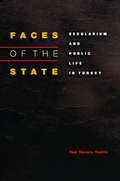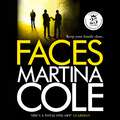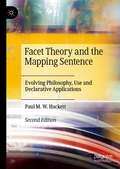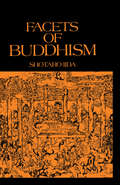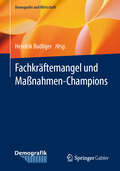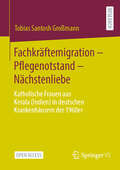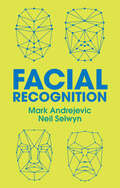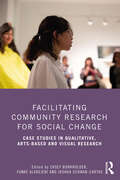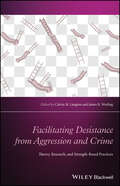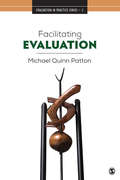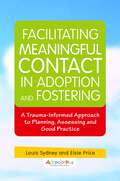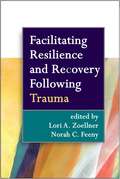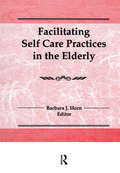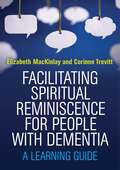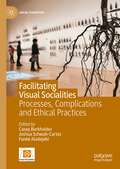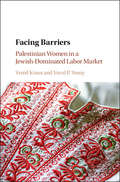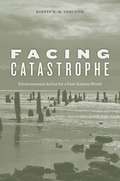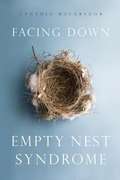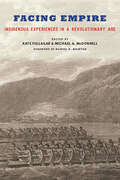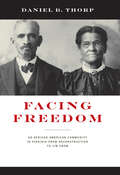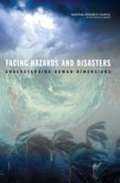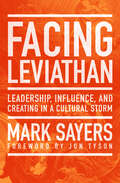- Table View
- List View
Faces of the State: Secularism and Public Life in Turkey
by Yael Navaro-YashinFaces of the State is a penetrating study of the production of a state-revering political culture in the public life of 1990s Turkey. In this new contribution to the anthropology of the state, Yael Navaro-Yashin brings recent poststructuralist and psychoanalytic theory to bear on the study of the political. Delving deeper than studies of nationalist discourse that would focus on consciously articulated narratives of political identity, the author explores sites of "fantasy" in the public-political domain of Istanbul. The book focuses on the conflict over secularism in the aftermath of an Islamist victory in the city's municipalities. In contrast with studies that would problematize and objectify religious movements, the author examines the agency of secularists under a state widely known for its "secularist" policies. The complexity and dynamism of the context studied moves well beyond scholarly distinctions between "secularity" and "religion," as well as "state" and "society." Here, secularism and Islamism emerge as different guises for a culture of statism where people from "society" compete to claim "Turkish culture" for themselves and their life practices. With this work that stretches the boundaries of regionalism, the author situates her anthropological study of Turkey not only in scholarship on the Middle East, but also in the broader problem of thinking "Europe" anew.
Faces: A chilling thriller of loyalty and betrayal
by Martina ColeJust before Danny Cadogan's fourteenth birthday, his father, Big Dan, leaves his wife and children to face the wrath of the men sent to collect his gambling debt. Determined to protect his mother, brother and sister, overnight Danny becomes set on making his way in a violent and dangerous world. He becomes a Face. Not just a Face, but the most feared Face in the Smoke. Out for all he can get. At any cost. Danny's ruthlessness doesn't stop at his front door. He rules his family with an iron will - and his fists. But if his wife, Mary breaks her silence, it could shake Danny's criminal empire; right to the very core. And for a Face at the top of his game, there's only one way to go. Down. Because, after all, debts can be paid without money...(P)2012 Headline Digital
Facet Theory and the Mapping Sentence: Evolving Philosophy, Use and Declarative Applications
by Paul M.W. HackettThis book is the second edition of Facet Theory and the Mapping Sentence: Evolving Philosophy, Use and Application (2014). It consolidates the qualitative and quantitative research positions of facet theory and delves deeper into their qualitative application in psychology, social and the behavioural sciences and in the humanities. In their traditional quantitative guise, facet theory and its mapping sentence incorporate multi-dimensional statistics. They are also a way of thinking systematically and thoroughly about the world. The book is particularly concerned with the development of the declarative mapping sentence as a tool and an approach to qualitative research. The evolution of the facet theory approach is presented along with many examples of its use in a wide variety of research domains. Since the first edition, the major advance in facet theory has been the formalization of the use of the declarative mapping sentence and this is given a prominent position in the new edition. The book will be compelling reading for students at all levels and for academics and research professionals from the humanities, social sciences and behavioural sciences.
Facets Of Buddhism (Buddhism Ser.)
by Shotaro IidaThe author presents a selection of papers written over the last twenty or so years, spanning the period from early research into the then nearly unknown Madhyamika writer Bhavaviveka or Bhavya, amongst Tibetan refugees in India, up to the recent past where there interests have, perhaps, somewhat broadened to include comparative religion. The author has moe or less left the essays in their original form and has introduced some consistency in the citing of the names of Japanese scholars in order to aid the English speaking reader unfamiliar with Japanese.
Fachdidaktische Konzepte Sport: Zielgruppen und Voraussetzungen (Basiswissen Lernen im Sport)
by Nils NeuberDer Band gibt eine Übersicht über fachdidaktische Konzepte im Bereich der Voraussetzungen von Bewegungs-, Spiel- und Sportangeboten für Kinder und Jugendliche. Einleitend wird ein Überblick über allgemeine fachdidaktische Konzepte gegeben. Den Schwerpunkt bilden spezielle Konzepte zu den Voraussetzungen von Schülerinnen und Schülern, die in vier Kapiteln vorgestellt werden: Kinder, Jugendliche, Mädchen und Jungen sowie Heterogene Zielgruppen. Hinzu kommen die Voraussetzungen von Lehrkräften sowie von Bewegung, Spiel und Sport in der Schulentwicklung.
Fachkräftemangel und Maßnahmen-Champions (Demografie und Wirtschaft)
by Hendrik BudligerDer demografische Wandel stellt die Unternehmen vor große Herausforderungen. Neben strukturellen, zyklischen und unternehmensinternen Zusammenhängen ist er eine der Kernursachen für den zunehmenden Mangel an Arbeitskräften, insbesondere an gut ausgebildeten Fachkräften. Dieses Herausgeberwerk gibt einen Einblick in den aktuellen Fachkräftemangel und zeitgleich stellen Maßnahmen-Champions vor, wie sie in ihren Organisationen erfolgreiche Konzepte gegen den Fachkräftemangel umgesetzt haben. Die Leserinnen und Leser sollen von der Vielfalt der beschriebenen Maßnahmen gegen den Fachkräftemangel Ideen und Anregungen erhalten, um selbst in ihrer Organisation dem Fachkräftemangel entgegenzuwirken. Der Inhalt Grundzüge und Konzepte einer Organisationsdemografie Generationenmanagement – Theorie und Praxis Förderung der Arbeitsmarktfähigkeit und Arbeitsfähigkeit Gelebte HR-Strategie im Change-Prozess Digitales Workforce-Management HR Analytics als strategisches Instrument Maßnahmen gegen den Fachkräftemangel: Senior Talents fördern, Vereinbarkeit Familie und Beruf, Integration von Arbeitskräften aus Drittstaaten Praxisbeiträge aus Baugewerbe, Hotelbranche und Tech-Industrie
Fachkräftemigration – Pflegenotstand – Nächstenliebe: Katholische Frauen aus Kerala (Indien) in deutschen Krankenhäusern der 1960er
by Tobias Santosh GroßmannDieses Open-Access-Buch verfolgt das Ziel, die Migrationsbewegungen aus Indien in den 1960er Jahren anhand transdisziplinärer Ansätze der Historischen Migrationsforschung aufzuarbeiten. In der jungen Bundesrepublik führte der Wirtschaftsboom der Nachkriegszeit zur Modernisierung und zum Ausbau von Pflegeeinrichtungen. Dabei entstand eine kaum zu stillende geschlechtsspezifische Nachfrage nach Arbeitskräften: Frauen, die Krankenpflege als „Berufung“ ausüben sollten. Katholische Orden reagierten auf den Pflegenotstand ihrer Krankenhäuser, indem sie ab 1960 über internationale Kirchennetzwerke Ordenskandidatinnen aus dem christlich geprägten Kerala in Südindien anwarben. Der deutsche Staat wurde auf dieses innerkirchliche Modell aufmerksam. Ab 1964 wurden auf Anweisung des Innenministers von Baden-Württemberg in der hybriden „Nirmala-Aktion“ zwischen Staats- und Kirchenrecht durch katholische Akteure „indische Mädchen“ aus Kerala für staatliche Pflegeeinrichtungen rekrutiert. Die ersten Migrationsbewegungen transformierten sich bald zu einer Kettenmigration, bei der über Jahre hinweg mehrere tausend Frauen in den deutschen Pflegesektor migrierten. Der Rekonstruktion aus institutioneller Perspektive werden die subjektiven Erinnerungen von Pioniermigrantinnen gegenübergestellt. Die Einordnung in die historischen Kontexte der Empfänger- und Senderregion ermöglicht neue Sichtweisen auf die transnationalen Entwicklungen, welche Kerala und Deutschland seit den 1960ern verbinden.
Facial Recognition
by Mark Andrejevic Neil SelwynFacial recognition is set to fundamentally change our experience and understanding of monitoring, surveillance, and privacy. Backed by powerful industry interests, this technology is being integrated into many areas of society – from airports to shopping malls, classrooms to casinos. Despite the promise of security and efficiency, fears are growing that this technology is inherently biased, intrusive, and oppressive, with broad-ranging societal consequences. In this timely book, Neil Selwyn and Mark Andrejevic provide a critical introduction to facial recognition. Outlining its complex social history and future technical forms, as well as its conceptual and technical underpinnings, the book considers the arguments being advanced for the continued uptake of facial recognition. In assessing these developments, the book argues that we are at the cusp of a generational shift in surveillance technology that will reconfigure our expectations of anonymity in shared and public spaces. Throughout, the book addresses a deceptively simple question: do we really want to live in a world where our face is our ID? Facial Recognition is essential reading for students and scholars of media and communications studies, surveillance studies, criminology, and sociology, as well as for anyone interested in one of the defining technologies of our times.
Facilitating Community Research for Social Change: Case Studies in Qualitative, Arts-Based and Visual Research
by Casey Burkholder Joshua Schwab-Cartas Funké AladejebiFacilitating Community Research for Social Change asks: what does ethical research facilitation look like in projects that seek to move toward social change? How can scholars weave political and social justice through multiple levels of the research process? This edited collection presents chapters that investigate research facilitation in ways that specifically attempt to disrupt and challenge anti-Indigenous and anti-Black racism, ableism, homophobia, transphobia, patriarchy, and sexism to work toward social change. It also explores what it means to develop facilitation practices across multiple contexts and research settings, including specific facilitation methods considered by researchers working with visual and community-based methods with Black, Indigenous, and racialized communities. The complexities of how scholars negotiate decisions within their research with people and communities have an effect not only on how researchers construct their participants and communities, but also on the overall purpose of projects, the ways their projects are shared and disseminated, and what is learned in the doing of facilitation. This book will be of great interest to both emerging and established researchers working within the social sciences. It specifically attends to diverse fields within the social sciences that include health, media studies, environmental studies, social work, sociology, education, participatory visual research methodologies, as well as the evolving field of digital humanities.
Facilitating Desistance from Aggression and Crime: Theory, Research, and Strength-Based Practices (Wiley Clinical Psychology Handbooks)
by Calvin M. Langton James R. WorlingIn Facilitating Desistance from Aggression and Crime: Theory, Research, & Strength-Based Practices, Drs. Calvin Langton and James Worling have gathered together internationally renowned authorities in the fields of psychology, psychiatry, criminology, social work, and law, to critically examine desistance as a construct, process, and outcome as well as the place of strengths work in correctional and forensic mental health settings. Integrating theory, emprical evidence, and applied practices, this timely volume is an essential scholarly resource with a clear practical emphasis for policy makers, researchers, practitioners, and graduate students.
Facilitating Evaluation: Principles in Practice (Evaluation in Practice Series #2)
by Michael Quinn PattonMichael Quinn Patton’s Facilitating Evaluation: Principles in Practice is the first book of its kind to explain in depth and detail how to facilitate evaluation processes with stakeholders. Using the author’s own stories of his experiences as an evaluation facilitator, the book illustrates the five evaluation facilitation principles that are the organizing framework for addressing how to work with stakeholders to generate evaluation questions, make decisions among methods, interpret findings, and participate in all aspects of evaluation. Ultimately, this book will help readers perform facilitation to enhance the relevance, credibility, meaningfulness, and utility of evaluations. "A must-read for anyone considering a high-impact evaluation!" –Margaret Lombe, Boston College
Facilitating Evaluation: Principles in Practice (Evaluation in Practice Series #2)
by Michael Quinn PattonMichael Quinn Patton’s Facilitating Evaluation: Principles in Practice is the first book of its kind to explain in depth and detail how to facilitate evaluation processes with stakeholders. Using the author’s own stories of his experiences as an evaluation facilitator, the book illustrates the five evaluation facilitation principles that are the organizing framework for addressing how to work with stakeholders to generate evaluation questions, make decisions among methods, interpret findings, and participate in all aspects of evaluation. Ultimately, this book will help readers perform facilitation to enhance the relevance, credibility, meaningfulness, and utility of evaluations. "A must-read for anyone considering a high-impact evaluation!" –Margaret Lombe, Boston College
Facilitating Meaningful Contact in Adoption and Fostering: A Trauma-Informed Approach to Planning, Assessing and Good Practice
by Elizabeth Price Kim Golding Adoptionplus Louis SydneyMost children who are fostered or adopted have some level of contact with their birth family -- whether face-to-face or by letter -- yet most of the time the psychological impact of contact on the child isn't considered. This book explores what attachment, neuroscience and trauma tell us about how contact affects children, and shows how poorly executed contact can be unhelpful or even harmful to the child. Assessment frameworks are provided which take the child's developmental needs into account. The authors also outline a model for managing and planning contact to make it more purposeful and increase its potential for therapeutic benefit. The book covers the challenges presented by the internet for managing contact, unique issues for children in kinship care, problems that arise when adoptive parents separate and many other key issues for practice. Brimming with practical advice and creative solutions, this is an indispensable tool for social workers, contact centre workers, and other professionals involved in contact arrangements or the therapeutic support of fostered and adopted children.
Facilitating Resilience and Recovery Following Trauma
by Lori A. Zoellner Norah C. FeenyThis volume synthesizes cutting-edge research on natural processes of resilience and recovery, highlighting implications for trauma treatment and prevention. Prominent experts examine what enables many trauma survivors to heal over time without intervention, as well what causes others to develop long-term psychiatric problems. Identifying key, modifiable risk and resilience factors--such as cognitions and beliefs, avoidance, pain, and social support--the book provides recommendations for when (and when not) to intervene to promote recovery. Illustrative case examples are included. A section on specific populations discusses children, military personnel, and low socioeconomic status or marginalized communities.
Facilitating Self Care Practices in the Elderly
by Barbara J HornThis book is a synthesis of current knowledge from published sources and expert consultants relating to three commonly occurring problems in home health care practice--self-administration of medications, family caregiving issues, and teaching the elderly. For each problem addressed, assessment guides and interventions are outlined, making this book an invaluable resource for professionals, researchers, and agencies concerned with providing top-quality care for the elderly. Home health care agencies can use the guide for orientation of new staff and inservice education for current staff. Home health care staff can use many of the assessment guides and resource lists in their work with clients. Facilitating Self Care Practices in the Elderly can also serve as a basis for standard development. Researchers interested in these clinical problems will find that the literature review and synthesis will facilitate the development of the theoretical underpinning for their research. Educators will find the book helpful in courses and as a basis for curriculum development. First Published in 1990. Routledge is an imprint of Taylor & Francis, an informa company.
Facilitating Spiritual Reminiscence for People with Dementia: A Learning Guide
by Elizabeth Mackinlay Corinne TrevittSpiritual reminiscence is a way of communicating that acknowledges the person as a spiritual being and seeks to engage the person in a more meaningful and personal way. This practical guide teaches carers how to facilitate engaging and stimulating spiritual reminiscence sessions with older people, and particularly with people with dementia. After reading the guide, carers will understand the many and varied benefits of spiritual reminiscence, and will have developed the skills, confidence and communication techniques needed to support people with dementia in this activity. The authors present in accessible terms the evidence-base to support the benefits of the approach and provide clear, step-by-step instructions for facilitating spiritual reminiscence sessions, including useful suggestions for ideas and questions to stimulate discussion. Intended to be used either as a self-learning tool or as the basis for staff training sessions, this will be a valuable resource for staff in care homes and day centres, activity coordinators, pastoral and spiritual care professionals, clergy and spiritual leaders.
Facilitating Visual Socialities: Processes, Complications and Ethical Practices (Social Visualities)
by Casey Burkholder Joshua Schwab-Cartas Funké AladejebiThis edited collection seeks to enrich the dialogue about the expansive possibilities of visual sociological research facilitation. Although facilitating ethical research has long been identified within medical research literatures, there is a dearth of distinct perspectives and voices in academic theorizing when it comes to facilitating ethical research. For example, how can researchers learn and incorporate community created approaches to facilitation into their visual research approaches? Although ethics, positionality, and reflexivity remain important components of visual research, the authors argue that the incremental decisions made in real time by research facilitators within the process of visual research is currently under-theorized. This edited collection seeks to discuss how thinking about facilitation in a more critical and nuanced manner, as well as thinking through the kinds of relations, problems and local changes that happen within a project, can help visual sociological researchers move towards more equitable research practices.
Facing Barriers: Palestinian Women in a Jewish-Dominated Labor Market
by Vered Kraus Yuval YonayPalestinian women have slowly become active in the formal labor market in Israel. In this book, Vered Kraus and Yuval Yonay describe and analyse the labor experience of these Palestinian women, and explain why Palestinian and Jewish women have different rates and outcomes in the labor market. <P><P>Challenging popular views that ascribe these differences to Arab culture and Islam, they instead find that it is state policies and widespread discrimination that hinder Palestinian women's participation and success. By including the various Palestinian sub-groups - Muslims, Bedouins, Druze, Christians, non-citizen residents of Jerusalem - this book shows how the specific life circumstances of the women from these subgroups affect their employment and achievements. The book thus enriches the acute discussion on the labour market experiences of Muslim and Arab women in the Middle East and North Africa and in advanced industrialized societies.
Facing Catastrophe: Environmental Action for a Post-Katrina World
by Robert R. VerchickAs Hurricane Katrina vividly revealed, disaster policy in the United States is broken and needs reform. What can we learn from past disasters—storms, floods, earthquakes, tsunamis, landslides, and wildfires—about preparing for and responding to future catastrophes? How can these lessons be applied in a future threatened by climate change? In this bold contribution to environmental law, Robert Verchick argues for a new perspective on disaster law that is based on the principles of environmental protection. His prescription boils down to three simple commands: Go Green, Be Fair, and Keep Safe. “Going green” means minimizing exposure to hazards by preserving natural buffers and integrating those buffers into artificial systems like levees or seawalls. “Being fair” means looking after public health, safety, and the environment without increasing personal and social vulnerabilities. “Keeping safe” means a more cautionary approach when confronting disaster risks. Verchick argues that government must assume a stronger regulatory role in managing natural infrastructure, distributional fairness, and public risk. He proposes changes to the federal statutes governing environmental impact assessments, wetlands development, air emissions, and flood control, among others. Making a strong case for more transparent governmental decision-making, Verchick offers a new vision of disaster law for the next generation.
Facing Down Empty Nest Syndrome
by Cynthia Macgregor"Remember when you initially learned you were pregnant with your firstborn (or possibly your only child)? Even then your life began to change. Before your child made his or her debut into the world, your life already began to be altered--maybe even radically altered. . . . For the next eighteen years, at minimum, a good chunk of your life was centered around your child. . . . For those eighteen or more years, you devoted a lot of your life--not just your time but your energies, your concerns, your thoughts, and your activities--to that child or those children. . . . And now they're gone, or close to moving out, and your life has a big void in it, a hole that you're not sure how to fill." In her book Facing Down Empty Nest Syndrome, Cynthia MacGregor helps all parents begin to cope with their children moving out and on with their lives. She gives practical advice on what to do before, during, and after children leave the home. She gives tips on how to stay connected without being overbearing as well as what to do with all of the extra time without kids at home.
Facing Empire: Indigenous Experiences in a Revolutionary Age
by Kate Fullagar and Michael A. McDonnellA comprehensive volume that interrogates European imperialism from the perspective of indigenous experiences.The contributors to Facing Empire reimagine the Age of Revolution from the perspective of indigenous peoples. Rather than treating indigenous peoples as distant and passive players in the political struggles of the time, this book argues that they helped create and exploit the volatility that marked an era while playing a central role in the profound acceleration in encounters and contacts between peoples around the world. Focusing in particular on indigenous peoples’ experiences of the British Empire, this volume takes a unique comparative approach in thinking about how indigenous peoples shaped, influenced, redirected, ignored, and sometimes even forced the course of modern imperialism. The essays demonstrate how indigenous-shaped local exchanges, cultural relations, and warfare provoked discussion and policymaking in London as much as it did in Charleston, Cape Town, or Sydney. Facing Empire charts a fresh way forward for historians of empire, indigenous studies, and the Age of Revolution and shows why scholars can no longer continue to exclude indigenous peoples from histories of the modern world. These past conflicts over land and water, labor and resources, and hearts and minds have left a living legacy of contested relations that continue to resonate in contemporary politics and societies today. Covering the Indian and Pacific Oceans, Australia, and West and South Africa, as well as North America, this book looks at the often misrepresented and underrepresented complexity of the indigenous experience on a global scale.Contributors: Tony Ballantyne, Justin Brooks, Colin G. Calloway, Kate Fullagar, Bill Gammage, Robert Kenny, Shino Konishi, Elspeth Martini, Michael A. McDonnell, Jennifer Newell, Joshua L. Reid, Daniel K. Richter, Rebecca Shumway, Sujit Sivasundaram, Nicole Ulrich
Facing Eugenics
by Erika DyckFacing Eugenics is a social history of sexual sterilization operations in twentieth-century Canada. Looking at real-life experiences of men and women who, either coercively or voluntarily, participated in the largest legal eugenics program in Canada, it considers the impact of successive legal policies and medical practices on shaping our understanding of contemporary reproductive rights. The book also provides deep insights into the broader implications of medical experimentation, institutionalization, and health care in North America.Erika Dyck uses a range of historical evidence, including medical files, court testimony, and personal records to place mental health and intelligence at the centre of discussions regarding reproductive fitness. Examining acts of resistance alongside heavy-handed decisions to sterilize people considered "unfit," Facing Eugenics illuminates how reproductive rights fit into a broader discussion of what constitutes civil liberties, modern feminism, and contemporary psychiatric survivor and disability activism.
Facing Freedom: An African American Community in Virginia from Reconstruction to Jim Crow (The American South Series)
by Daniel B. ThorpThe history of African Americans in southern Appalachia after the Civil War has largely escaped the attention of scholars of both African Americans and the region. In Facing Freedom, Daniel Thorp relates the complex experience of an African American community in southern Appalachia as it negotiated a radically new world in the four decades following the Civil War. Drawing on extensive research in private collections as well as local, state, and federal records, Thorp narrates in intimate detail the experiences of black Appalachians as they struggled to establish autonomous families, improve their economic standing, operate black schools within a white-controlled school system, form independent black churches, and exercise expanded—if contested—roles as citizens and members of the body politic. Black out-migration increased markedly near the close of the nineteenth century, but the generation that transitioned from slavery to freedom in Montgomery County established the community institutions that would survive disenfranchisement and Jim Crow. Facing Freedom reveals the stories and strategies of those who pioneered these resilient bulwarks against the rising tide of racism.
Facing Hazards And Disasters: Understanding Human Dimensions
by Opportunities Committee on Disaster Research in the Social Sciences: Future ChallengesSocial science research conducted since the late 1970s has contributed greatly to society&#39s ability to mitigate and adapt to natural, technological, and willful disasters. However, as evidenced by Hurricane Katrina, the Indian Ocean tsunami, the September 11, 2001 terrorist attacks on the United States, and other recent events, hazards and disaster research and its application could be improved greatly. In particular, more studies should be pursued that compare how the characteristics of different types of events&#8212including predictability, forewarning, magnitude, and duration of impact&#8212affect societal vulnerability and response. This book includes more than thirty recommendations for the hazards and disaster community.
Facing Leviathan: Leadership, Influence, and Creating in a Cultural Storm
by Mark SayersThere are two styles of leadership at war in the world.On one side the mechanical leader casts a vision of heroic action aided by pragmatism, reason, technology, and power.On the other side the organic leader strives to bring forth creativity, defying convention, and relishing life in culture&’s margins.This leadership battle is at the heart of our contemporary culture, but it is also an ancient battle. It is the reinvocation of two great heresies, one rooted in an attempt to reach for godlikeness, the other bowing before the sea monster of the chaotic deep.Today&’s leader must answer many challenging questions including:What does it mean to lead in a cultural storm?How do I battle the darkness in my own heart?Is there such a thing as a perfect leader?Weaving a history of leadership through the Enlightenment, Romanticism, tumultuous 19th-century Paris, and eventually World War II, cultural commentator Mark Sayers brings history and theology together to warn of the dangers yet to come, calling us to choose a better way.
